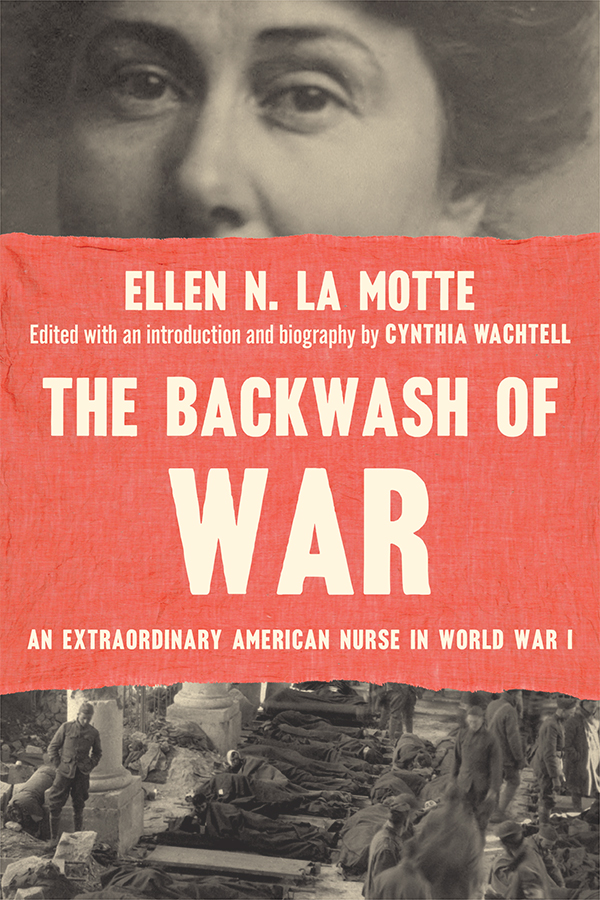Contents
Guide

The Backwash of War
The Backwash of War
AN EXTRAORDINARY AMERICAN NURSE IN WORLD WAR I
Ellen N. La Motte
EDITED WITH AN
INTRODUCTION AND BIOGRAPHY BY
CYNTHIA WACHTELL

Johns Hopkins University Press
Baltimore
2019 Johns Hopkins University Press
All rights reserved. Published 2019
Printed in the United States of America on acid-free paper
2 4 6 8 9 7 5 3 1
Johns Hopkins University Press
2715 North Charles Street
Baltimore, Maryland 21218-4363
www.press.jhu.edu
Library of Congress Cataloging-in-Publication Data
Names: La Motte, Ellen N. (Ellen Newbold), 18731961, author. | Wachtell, Cynthia, 1967, editor.
Title: The backwash of war : an extraordinary American nurse in World War I / by Ellen N. La Motte ; edited with an introduction and biography by Cynthia Wachtell, editor.
Description: Baltimore : Johns Hopkins University Press, [2019] | Includes index.
Identifiers: LCCN 2018018036 | ISBN 9781421426716 (pbk. : alk. paper) | ISBN 9781421426723 (electronic) | ISBN 1421426714 (pbk. : alk. paper) | ISBN 1421426722 (electronic)
Subjects: LCSH: La Motte, Ellen N. (Ellen Newbold), 18731961. | World War, 19141918Personal narratives. | World War, 19141918Medical careWestern Front. | World War, 19141918Hospitals. | World War, 19141918Casualties. | SoldiersFranceHistory20th century. | NursesUnited StatesBiography. | Military nursingUnited StatesHistory20th century.
Classification: LCC D640 .L2 2019 | DDC 940.4/76dc23
LC record available at https://lccn.loc.gov/2018018036
A catalog record for this book is available from the British Library.
Special discounts are available for bulk purchases of this book. For more information, please contact Special Sales at 410 -- 6936 or specialsales@press.jhu.edu.
Johns Hopkins University Press uses environmentally friendly book materials, including recycled text paper that is composed of at least 30 percent post-consumer waste, whenever possible.
To my sons and students
They have taught me so much
The most horrible war book ever written is The Backwash of War, by Miss Ellen La Motte, an American nurse who served with the French army. It is so bad that, when the United States entered the late war, it was suppressed by the department of justice.
H. L. Mencken, 1927
Contents
Acknowledgments
This volume is the fulfillment of a dream long deferred. As a graduate student in the early 1990s, I came across The Backwash of War during my research and was deeply disheartened that such an extraordinary work had slid into literary obscurity. A quarter of a century later, I am delighted to help bring the book to light, accompanied by Ellen N. La Mottes remarkable war essays. I am also delighted to have researched and written the first biography of its remarkable author, Ellen N. La Motte. For me, this has been a work of passion, but it has not been a solo endeavor.
I am extremely grateful to the following institutions for the use of their collections and for the many kind and helpful staff members who assisted me with my research: Alan Mason Chesney Medical Archives of the Johns Hopkins Medical Institutions; Beinecke Rare Book and Manuscript Library, Yale University; British Library; Chicago History Museums Research Center; Howard Gotlieb Archival Research Center, Boston University; Library of Congress; British National Archives; Nemours Estate; New York Public Library; Royal College of Nursing Library; Schlesinger Library at the Radcliffe Institute, Harvard University; US National Archives and Records Administration; Washington and Lee University Library; Olin Library, Washington University; and Steinberg Library, Yeshiva University. I am also tremendously appreciative of those who shared with me material in their private collections. Thanks to one and all.
I owe thanks to many others as well, including the wonderful team at Johns Hopkins University Press, who helped me to realize this book. Laura Davulis, Lauren Straley, and Elizabeth Demers gave sound editorial advice and were delightfully enthusiastic. Melanie Mallon and Juliana McCarthy copyedited with great care and expert wordsmithing. I am profoundly indebted to them and their colleagues for the production of this volume. I am also very grateful to Dean Karen Bacon, of Yeshiva University, for her understanding of my time commitment to this project, and to the organizers of two superb conferences, World War I: Dissent, Activism, and Transformation and Women and World War I, where I presented portions of this work. My friends and family also offered valuable guidance and encouragement along the way and have generously understood when I vanished into the land of La Motte. Thanks most of all to Gabe, Jules, and Jeff.
Introduction
In September 1916, as World War I advanced into a third deadly year, an American woman named Ellen N. La Motte published a collection of stories about her experience as a war nurse. She titled the volume The Backwash of War: The Human Wreckage of the Battlefield as Witnessed by an American Hospital Nurse . Long forgotten, this astounding book by an extraordinary woman well merits a place among major works of World War I.
The Backwash of War presents an unflinching look at the destruction done by war to the human body and spirit. La Motte based the interrelated stories on what she witnessed while working in a French field hospital in Belgium, located jarringly near the firing line. In a story midway through the book, she explains, Well, there are many people to write you of the noble side, the heroic side, the exalted side of war. I must write you of what I have seen, the other side, the backwash.
The patients that La Motte presents are at once grotesque and pathetic. She writes of a patient slowly dying from gas gangrene, another suffering from syphilis, and a man who sobs and sobs because he does not want to die. She writes of a ten-year-old Belgian boy who has been shot through the abdomen by a fragment of German artillery shell. The French surgeon operates on him with all-too-evident irritation, and the boys own mother impatiently sits by his side, listening to his ravings and bawlings as he dies.
La Motte sketches these patients and others, whose lives intersect at the field hospital. She depicts the vain doctors, overworked nurses, and lazy orderlies, who jointly care for the war-torn patients. She describes the local women and teenage girls, who prostitute themselves to soldiers and surgeons. She presents the pompous, preening generals, who arrive and perfunctorily pin medals on the bandaged heaps that once were men.
The Backwash of War was published simultaneously in New York and London, but it was eventually censored in both places. It was immediately suppressed in wartime England and France, but in America, the book freely circulated for nearly two years and was hailed as a stunning and unparalleled work of antiwar writing and went through multiple printings. Then in late summer 1918, it was also suppressed in the United States because it was deemed damaging to morale. Except for the books unsuccessful re-release in late 1919 and a new edition published in 1934, which received slight notice, The Backwash of War virtually vanished for nearly a century.
The time has come to reclaim this lost classic and restore it to its proper place among seminal works of war writing. Apart from its literary merit, Backwash is remarkable in several ways. It is one of the earliest antiwar works of literature about World War I, published more than a dozen years before such classics as Erich Maria Remarques All Quiet on the Western Front (1929) and Ernest Hemingways A Farewell to Arms (1929). It was written by an American woman who actually had firsthand experience of the war. It was published before the United States had even entered the fray. And it is one of Americas few banned books of the World War I era.











